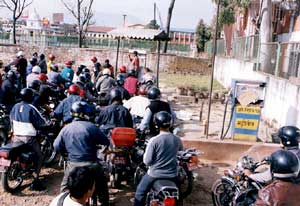 Although our own conflict is on hold, Nepal will feel the economic impact of the American war on Iraq that began with a dramatic cruise missile raid on Baghdad Thursday morning.
Although our own conflict is on hold, Nepal will feel the economic impact of the American war on Iraq that began with a dramatic cruise missile raid on Baghdad Thursday morning. The war couldn't have come at a worse time for Nepal. Tourism, which was just beginning to pick up after the ceasefire, had started seeing cancellations as fears of war mounted in the past weeks. Most flights from Europe to Kathmandu have stopovers in the Gulf or overfly west Asia. The Nepali travel industry is in deep gloom, and is only hoping that the war will be short and decisive.
A much-graver impact would be on overseas remittances from Nepali workers. There are an estimated 300,000 Nepalis in the Gulf region, with 6,000 workers in Kuwait which is now a frontline state in the war. There are another 85,000 Nepalis in Saudi Arabia, 65,000 in Qatar and nearly 4,000 in Bahrain. Together, these Nepalis remit an estimated Rs 30 billion back home every year.
Officials from the ministries of foreign affairs, supply, home and transport met all day Thursday in an emergency session, but there was no question of being able to evacuate all Nepali workers in case of a full-scale war. "It would not be possible to bring back all the Nepalis from the Gulf and provide them alternative employment," admitted Yuba Raj Khatiwada, member of the National Planning Commission.
A cabinet meeting on Thursday was expected to decide on a range of options from fuel rationing to odd-even rules on vehicles so as to reduce consumption. Nepal Oil Corporation depots in Thankot and Amlekhganj are said to have enough storage capacity to last only one month of normal consumption.
Government spokesman Ramesh Nath Pandey said Wednesday "all necessary steps would be taken if war broke out". Some gas retailers took this to mean that the government would hike the price, and shut shop to hoard their stock. This spread panic-buying, and led to most gas stations to close by noon Thursday.
Officials told us there was nothing to worry about. "The supply of fuel is regular and there is no need to introduce provisions like rationing at the moment," NP Sanjel, from the Ministry of Industry, Commerce and Supplies told us. Even without the war, the government was reviewing the price of kerosene and diesel to check adulteration and smuggling across the border.
The Nepali economy is going to take a direct hit. "The Iraq war will have a multiple effect on the Nepali economy," says economist Biswombher Pyakuryal. "It will not only reduce remittances sent by Nepalis working in the Gulf countries, but could also have an adverse impact on Nepal's exports to the US and its allies."


